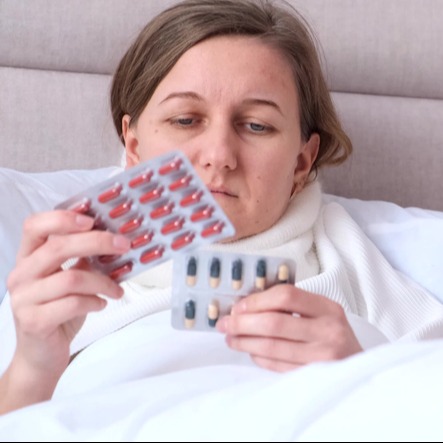
On September 12, 2023, the Nonprescription Drug Advisory Committee of the US Food and Drug Administration (FDA) released a report detailing their findings on a common over-the-counter (OTC) nasal decongestant called phenylephrine.
Phenylephrine is found in several OTC cold medications, often in combination with antihistamines for multi-symptom relief.
This FDA committee met because there is a problem with oral phenylephrine that we’ve been aware of for some time: it doesn’t work. Naturally, readers may wonder how a useless decongestant has been sold in stores for so long. The story is long and nuanced, but we will try to make it understandable.
How Decongestants Work
People with allergies and colds have congestion because the blood vessels in their noses are swollen and dilated. Phenylephrine belongs to a large family of compounds whose primary effect is narrowing blood vessels, reducing nose swelling, and making breathing easier.
All would be well and good if making nasal congestion go away were all these compounds did; of course, they have other unwanted effects (i.e., side effects). These include raising blood pressure, crossing into the brain, causing agitation and sleeplessness, and causing an upset stomach. The balance between desired and side effects depends on many factors, including the route (e.g., oral, nasal, or intravenous) and, perhaps most importantly, the dose.
Phenylephrine causes everything you’d want a nasal decongestant to do, but only at doses so high that the side effects would be intolerable, even dangerous. The only safe way to take phenylephrine orally is in quantities so small that it does nothing for congestion. So why is it sold OTC as a decongestant?
The Mess Meth Made
The answer can be summed up in one four-letter word: meth.
In the early 2000s, the US government was pressured into acting against the raging methamphetamine problem. So-called ‘meth labs’ were popping up nationwide, and information was available on the internet on how to manufacture (or ‘cook’) methamphetamine without sophisticated industrial equipment.
The starting materials for making meth are inexpensive and available in your local strip mall. One ingredient was pseudoephedrine, a popular decongestant found in many OTC cold medicines.
In response, Congress passed The Combat Methamphetamine Epidemic Act of 2005 (CMEA), designed to prevent people from buying large amounts of cold medicines to make into methamphetamine.
Among other things, the CMEA made it challenging to purchase medications containing pseudoephedrine. Pharmacists were limited regarding how much they could sell, and consumers had to fill out forms and produce identification to buy these cold medicines. In short, pseudoephedrine became a ‘behind-the-counter’ drug.
Large pharmaceutical producers responded by replacing pseudoephedrine with phenylephrine in their products. Very quickly, consumers noticed that the new formulations didn’t work as well as the old ones.
Bad Science
The meth crisis wasn’t the only reason for the rise of phenylephrine. There was also some questionable science involved. The September 12 report noted that early scientific reports were wrong about how much oral phenylephrine would reach the blood vessels in the nose. Those reports said the amount was around 30% of the ingested dose. More accurate studies showed that the actual amount was closer to 1%. Phenylephrine was literally doing nothing at all. In excruciating detail, the FDA panel report documented all the evidence to suggest that oral phenylephrine is useless as a decongestant.
What This All Means
The FDA panel did not affirmatively state that phenylephrine-containing products should be removed from the shelves. It is essential to note that the report made recommendations only. It is up to the higher-ups at the FDA to make such recommendations.
If a drug has no desired effects, it can only provide side effects. The evidence is robust that the side effects of oral phenylephrine, as currently sold, are measurable but small. This means there are risks, but they are not so great that the drug must be pulled off the shelves ASAP. Instead, the FDA must decide if the benefits of maintaining its approval of oral phenylephrine outweigh those risks. Based on the September 12 report, oral phenylephrine’s days may be numbered.
The Law of Unintended Consequences
The report wisely noted that consumers demand OTC cold medicines that work. The panel said consumers who cannot access approved medications will seek unapproved and unregulated remedies, such as nutraceuticals and homeopathic agents. The law of unintended consequences states that your actions will always produce some unanticipated result you might not like (pseudoephedrine being used as a precursor to methamphetamine is an ideal example).
Critics pointed out that the CMEA did nothing to stem the meth epidemic, so the best approach would be to repeal the CMEA and bring pseudoephedrine out from behind the counter. Recent history suggests that this is not likely to happen. Even though recreational marijuana is legal in almost half the states, it is still classified as a Schedule 1 drug by the federal government. The bottom line is that the government rarely reverses itself.
Possible Solutions
The good news is that nasal phenylephrine is still available OTC and has been demonstrated effective in reducing nasal congestion. The problem is that individuals are unwilling to squirt medications in their noses. If educated properly, consumers might be persuaded to take nasal medications more seriously.
It is also critical to ensure consumers buy the correct product for the right reasons. The best way to ensure this is to consult a medical professional, especially if you have a condition like high blood pressure or other heart problems.
PlanetDrugsDirect.com is a member of the Canadian International Pharmacy Association (CIPA). We do not offer for sale any pseudoephedrine-containing product or any potentially addiction-forming medication.
Rely on PlanetDrugsDirect.com to Buy Online Prescription Drugs
As a trusted prescription referral service, we offer important benefits whenever you order online. Each of our partner pharmacies and/or government-approved dispensaries is committed to providing the best experience possible of any online prescription referral service on the internet. We offer:
Low prices
Quick turn-around times
Generic and brand-name medications
Unparalleled customer service
Sources
https://www.fda.gov/media/171915/download
https://www.deadiversion.usdoj.gov/GDP/(DEA-DC-4)%20Preventing%20the%20Retail%20Diversion%20of%20Pseudoephedrine.pdf
https://www.ncbi.nlm.nih.gov/pmc/articles/PMC2000711/



